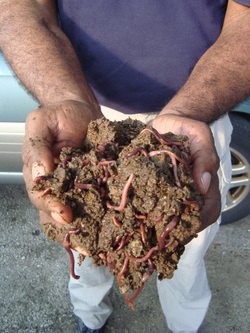Profiles in Green: Molly Scott, Vermicomposter
By Margaret Murray
By Margaret Murray

Molly Scott has discovered a secret weapon in her garden: worms. “I saw an ad in Town Talk and decided to take a class on vermicomposting,” says Scott. She got her first worms early this spring, and recently harvested her first batch of worm castings. The small, super-nutritious spirals of worm manure pack a punch when it comes to feeding plants. “My new landscape is thriving,” she says.
Scott keeps her 18-gallon worm bin in the basement. She started with five worms and now has several dozen. “All you need to get started is a container with some ventilation holes, some shredded paper, a little ground soil, and a spray bottle to keep everything moist. And worms, of course.” Scott says her seven-year-old twins love feeding food scraps to the worms. “Their first reaction was ‘That’s disgusting!’ But now they can’t wait to put on gloves and slide a few banana peels under the shredded paper,” says Scott. “They especially like the baby worms.”
Scott keeps her 18-gallon worm bin in the basement. She started with five worms and now has several dozen. “All you need to get started is a container with some ventilation holes, some shredded paper, a little ground soil, and a spray bottle to keep everything moist. And worms, of course.” Scott says her seven-year-old twins love feeding food scraps to the worms. “Their first reaction was ‘That’s disgusting!’ But now they can’t wait to put on gloves and slide a few banana peels under the shredded paper,” says Scott. “They especially like the baby worms.”
Scott and her twins, AJ and Natalie, feed their worms twice or three times a week. “What’s good for us is good for the worms,” says Scott. “No processed foods. No meat. They don’t like citrus either.”
The worm castings are harvested by emptying the bin contents onto a light-colored trash bag. With gloved hands, Scott plucks out the worms, careful to get even the tiniest ones, and returns them to the bin after putting in fresh paper, soil, and food scraps. What’s left on the bag is the “deathly hallows” of fertilizer: ultra-rich worm poop. Scott dilutes her castings in a 12-gallon water jug to make a “compost tea,” which she uses to water all of her new landscaping.
Scott’s plants aren’t the only ones to show the benefits of worm composting. In an experiment done by the University of Georgia’s Engineering Outreach Program, cherry tomato plants grown with worm castings grew on average an additional 126% from their typical height, as compared to 45% for those grown in potting mix. “I haven’t measured my new plants since I started feeding them the compost tea,” says Scott, “but my Sugar Plum tree looks great.”
“The objective of worm composting is to get away from harsh chemical fertilizers,” says Kanti Somani, vermiculture expert and creator of the website Worms.com. Somani started composting with worms twenty years ago as a hobby and has since watched it take off as a popular technique, gathering a sub-culture of followers. “For too long we have diverted organic waste to landfills,” she says.
Scott says she started worm composting for her children. “We adults are always talking to our kids about recycling,” she says. “Worms are the ultimate recyclers! I think my kids now understand that even the smallest creatures have a purpose.”
There is one problem. “Now our family has to stop and rescue every earthworm we see.”
Margaret Murray is a rising senior at Strath Haven High School.
The worm castings are harvested by emptying the bin contents onto a light-colored trash bag. With gloved hands, Scott plucks out the worms, careful to get even the tiniest ones, and returns them to the bin after putting in fresh paper, soil, and food scraps. What’s left on the bag is the “deathly hallows” of fertilizer: ultra-rich worm poop. Scott dilutes her castings in a 12-gallon water jug to make a “compost tea,” which she uses to water all of her new landscaping.
Scott’s plants aren’t the only ones to show the benefits of worm composting. In an experiment done by the University of Georgia’s Engineering Outreach Program, cherry tomato plants grown with worm castings grew on average an additional 126% from their typical height, as compared to 45% for those grown in potting mix. “I haven’t measured my new plants since I started feeding them the compost tea,” says Scott, “but my Sugar Plum tree looks great.”
“The objective of worm composting is to get away from harsh chemical fertilizers,” says Kanti Somani, vermiculture expert and creator of the website Worms.com. Somani started composting with worms twenty years ago as a hobby and has since watched it take off as a popular technique, gathering a sub-culture of followers. “For too long we have diverted organic waste to landfills,” she says.
Scott says she started worm composting for her children. “We adults are always talking to our kids about recycling,” she says. “Worms are the ultimate recyclers! I think my kids now understand that even the smallest creatures have a purpose.”
There is one problem. “Now our family has to stop and rescue every earthworm we see.”
Margaret Murray is a rising senior at Strath Haven High School.

 RSS Feed
RSS Feed